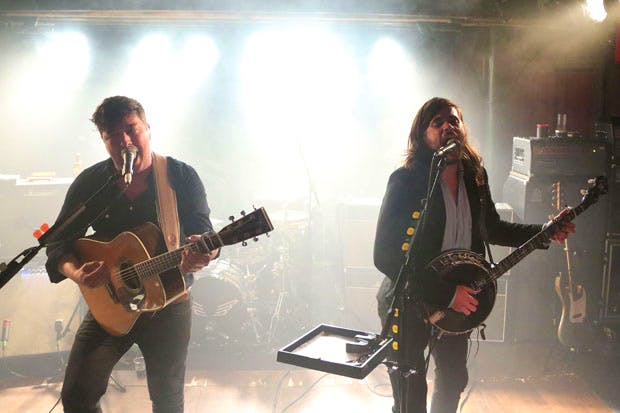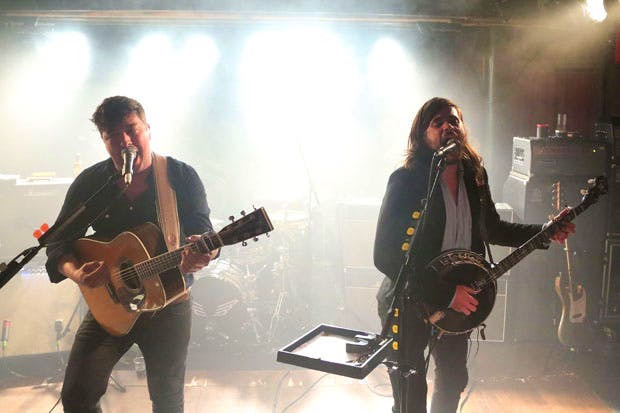Like a lot of essentially cautious people, I like my music to take some risks, play with fire and damn the consequences. In truth, of course, most musicians are every bit as conservative as the rest of us: they do whatever it is they do and if it sells, they keep on doing it until they drop. Three small cheers, then, for Mumford & Sons, who with their recently released third album took a completely unexpected swerve away from the phony banjo-intensive folk that had made their name and their fortune, into the stadium rock’n’roll they have obviously always wanted to play. As may have been gently hinted at in previous columns, I developed a visceral and irrational loathing for their first two records, their tunelessness, their lead singer’s annoying voice and the whole construct’s utter falsity. Every record they made had the sound not of life lived but of other records listened to and faithfully duplicated. Americans fell madly in love with them. They can spot inauthenticity among their own from a thousand paces, but British inauthenticity often passesthem by.
Now, it’s as though that awful music never happened. Guitars have been plugged in, the singer’s voice is down in the mix, and every song seems precision-tooled for the stadium circuit. It’s rather more anonymous music, in that it sounds like roughly 10,000 other bands, but success, as we know, has its own momentum, and the Mumfords will surely scale vast himalayas of lucrative rocking mediocrity, without imposing their wispy beards on the rest of us. I feel only relief, tempered by a certain reluctant respect. They didn’t have to make this change. They could have gone on twiddling and bleating for 30 years. But they were obviously bored to death with it all, and saw no reason for continuing to pretend. Good for them.
Of course the reviews have been brutal. There’s nothing that critics hate more than a band ‘selling out’, although if you are to make a living at all these days, I’m not sure what else you are supposed to do. The fact that the Mumfords have made this change when there was no financial imperative to does not seem to have counted in their favour. But if the Americans are obsessed with authenticity in their music, we are obsessed with integrity in ours. The Mumfords are seen to be chasing the money with slightly too much glee, and a complete absence of shame. For all the changes in British society over the past 30 years, this still doesn’t go down well.
A similar disapproval crept into the obituaries last month for Errol Brown, leader of Hot Chocolate, who died aged 71. Hot Chocolate were known for a string of shame-free hit singles in the 1970s and early 1980s, written or co-written by Brown and produced with a notable absence of frills by Mickie Most. They are fantastic, these songs: direct, richly tuneful and built to last. I liked them so much that I even bought a couple of the albums, which wasn’t a good idea: three great singles each time and tons of filler. But a couple of obits said that if you look past the hits, their early albums contained some really adventurous material, which no one has ever heard except for the writer of the obituary, who is much cooler than you. It’s so pathetic it makes my blood boil. The implication is that this early artistic promise was subsumed by a more base, commercial yearning for hits. And what if it was? Give me ‘You Sexy Thing’, ‘It Started With A Kiss’ or, best of all, ‘Every 1’s A Winner’ over ‘interesting’ early album tracks every time.
There are certain British characteristics that never quite expire, but just mutate. One is a detestation of spivvery in all its forms. Mickie Most was pure spiv, and a brilliant pop producer. Hot Chocolate wore silly white disco flares and therefore can be assumed to have known no better. What has changed now is that only posh boys like Mumford & Sons seem to have the confidence, the sheer brass neck, to embrace spivvery, for they are the musical equivalent of City boys and hedgies who have made fortunes and now do exactly as they wish. I still don’t like their music, but no one is forcing me to listen to it. Quite simply, they don’t seem to care what anyone thinks, and that is the source of their strength, and their success.
Got something to add? Join the discussion and comment below.
Get 10 issues for just $10
Subscribe to The Spectator Australia today for the next 10 magazine issues, plus full online access, for just $10.












Comments
Don't miss out
Join the conversation with other Spectator Australia readers. Subscribe to leave a comment.
SUBSCRIBEAlready a subscriber? Log in